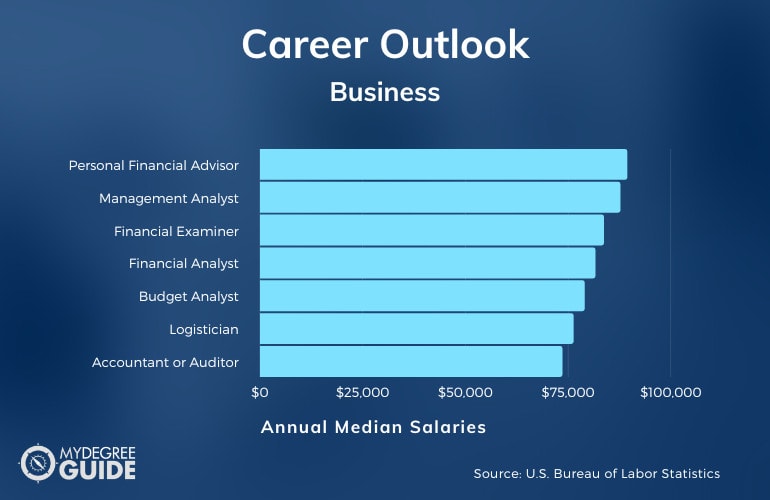Choosing between business degrees may not be an easy choice, especially if you’re interested in more than one area of business.

We’ll help you choose what to specialize in and give you a list of possible schools to attend, but no matter what you choose, you can be confident in your decision, knowing that business majors can make on average about twice as much when compared to other occupations.
Editorial Listing ShortCode:
25 Business Degrees
Click on the subject area you’re interested in to jump to that section.
- Accounting
- Business Administration
- Business Intelligence
- Construction Management
- Data Analytics
- Digital Marketing
- E-Commerce
- Entrepreneurship
- Finance
- Hospitality Management
- Human Resources
- International Business
- Logistics
- Management
- Management Information Systems
- Marketing
- Nonprofit Management
- Operations Management
- Organizational Leadership
- Procurement
- Project Management
- Real Estate
- Retail & Sales Management
- Sports Management
- Supply Chain Management
Whichever area of business you choose to specialize in, your traditional or online business degree can help prepare you to enter the growing job market.
Accounting

Businesses and individuals rely on accountants to keep track of their financial matters. Accountants work in public, private, and government settings.
As an accountant, you might keep financial records, submit tax forms, and analyze financial data. Your area of professional focus could be cost accounting, management accounting, or taxation.
Editorial Listing ShortCode:
To prepare you for a career, your bachelor’s in accounting or accountancy program may include classes like Non-Profit Accounting, Auditing, Business Law, and Statement Analysis.
According to the Bureau of Labor Statistics, the average salary for accountants is about $73,560.
Business Administration

For an overview of the business world, consider a degree in business administration. It’s one of the most popular majors among college students. The topics your program covers may include taxation, finance, ethics, human resources, marketing, business law, leadership, and accounting.
Editorial Listing ShortCode:
Your program may also equip you with skills to evaluate business data so that you can make reasonable projections and reliable decisions. After completing your program, you could enter the business world with a job in management, sales, operations, or consulting. If you want to further your studies, DBA online programs may pique your interest.
The average salary for business and financial occupations is $72,250. Business administration majors may pursue careers in this field. The projected growth in business administration jobs through the next 1o years is 8% (Bureau of Labor Statistics), which is faster than the average for all other occupations.
Business Intelligence

Data can drive decisions. That’s the idea behind business intelligence programs. A bachelor’s degree in this field can help prepare you to perform data analysis and turn your findings into forecasts and models.
Editorial Listing ShortCode:
Business intelligence degrees may include classes like Applied Analytics, Operations Management, and Predictive Analytics. This program can help prepare you to perform marketing analysis, provide consulting services, take responsibility for project management, or steer the operations of a company.
Business intelligence careers have an average salary of $98,230 per year (Bureau of Labor Statistics).
Construction Management

When you study construction management, you may learn principles from both construction and business.
On the building side of things, you may take classes like Construction Techniques and Safety Standards. Your business classes may cover topics like finance, economics, and management.
Editorial Listing ShortCode:
You may bring these two disciplines together in classes like Construction Law and Construction Business Operations. Construction management degrees can help prepare you to become a property manager, a safety manager, or a construction supervisor.
The average salary for a construction management job is roughly $97,180 per year (Bureau of Labor Statistics).
Data Analytics

Technology has made it easier than ever for businesses to collect large amounts of data.
A data analytics degree can help you learn about the information technology systems that are used for data accumulation and organization. It can also help equip you with the knowledge of how to put that data to good use.
Editorial Listing ShortCode:
The curriculum may cover spreadsheets, programming languages, statistics, big data, and visualization. Graduates often become researchers or analysts.
On average, the salary for a data analytics job is $98,230 per year (Bureau of Labor Statistics).
Digital Marketing

Internet marketers use digital channels to promote brand recognition and drive business growth. For success in this area, you’ll need to understand social media, graphic design, and consumer behavior.
Digital marketing degrees may contain courses that cover topics like web design, data analytics, behavioral psychology, business law, and global marketing.
Editorial Listing ShortCode:
After graduation, you might become a social media manager, a copywriter, a brand manager, or a marketing strategist.
Digital marketing careers have an average salary of $65,810, per year (Bureau of Labor Statistics).
E-Commerce

Online sales and business transactions have become standard practice. Becoming a specialist in e-commerce can help you learn how to make the most of digital technology for business growth.
Editorial Listing ShortCode:
An e-commerce degree can be useful if you want to operate your own store or manage sales for a larger company. Classes on information systems and digital marketing can help equip you with practical skills that you can use when conducting online sales to consumers or businesses.
E-commerce careers have an average annual salary of $77,420 (Bureau of Labor Statistics).
Entrepreneurship

A bachelor’s program in entrepreneurship can help you develop valuable skills for starting and growing businesses.
The courses may include Small Business Strategies, Product Innovation, and Building Customer Relationships. You may also study general business topics like marketing, accounting, economics, human resources, and data analysis.
Editorial Listing ShortCode:
You may be able to use your entrepreneur skills to start your own businesses or to help other companies develop new and effective strategies for growth.
Jobs related to entrepreneurship have an average salary of $72,250. However, entrepreneurship careers are expected to see a job growth of up to 8% over the next 10 years (Bureau of Labor Statistics).
Finance

Do you want to be a financial analyst, a stockbroker, a banker, or a financial advisor? If so, you might consider earning your bachelor’s degree in finance.
The coursework for finance degrees may include Introduction to Investments, Global Finance, Financial Law, and Portfolio Management. Other topics may be taxation, real estate, social responsibility, and non-profit finance.
Editorial Listing ShortCode:
After graduation, you might find a job in the financial sector or work in the finance department of hospitals, schools, businesses, or non-profit organizations.
With a job in the finance sector, you may earn an average yearly income of $81,430. As you grow throughout your career, you may seek a financial manager job. Financial manager jobs have a median annual salary of $134,180 and are expected to increase by 17% in job growth (Bureau of Labor Statistics).
Hospitality Management

If you’re drawn to the hotel and tourism industry, think about possibly making a career of this interest by majoring in hospitality management.
Professionals in this field may run hotels, resorts, convention centers, and other facilities that welcome guests. This degree can help you learn to abide by lodging laws and oversee housekeeping, front desk, culinary, and maintenance staff.
Editorial Listing ShortCode:
Your courses may also develop your skills for planning events, increasing sales, and delivering high-quality customer service.
The average salary for hospitality management careers is $56,670 (Bureau of Labor Statistics).
Human Resources

Strong HR professionals are critical for an organization’s success; with good leadership in this department, employees may be more satisfied and productive.
You can help prepare for this role with a bachelor’s degree in human resources. The university may offer classes like Workforce Recruitment, Benefits Packages, Training Programs, and Employment Law.
Editorial Listing ShortCode:
In addition, you’re may take core business classes in accounting, management, marketing, and communications. After graduation, these degrees may allow you to work as an HR professional in nearly any industry.
Entry-level human resources jobs have an average total compensation of $63,490. In the later parts of their career, employees may see an average salary of $121,220 (Bureau of Labor Statistics).
International Business

A major in international business can help you learn to conduct transactions with people around the world. You may learn about business topics like statistics, accounting, and marketing.
To get you ready for global interactions, you may also study political science, cultural practices, overseas trade, and supply chain logistics.
Editorial Listing ShortCode:
Graduates of international business programs may work for large corporations with global offices or conduct multicultural interactions in their jobs as sales, operations, or supply chain managers.
A graduate with a business degree in international business may earn on average $96,390 per year (Bureau of Labor Statistics).
Logistics

People who work in logistics are in charge of coordinating the transportation and delivery of goods. They make sure that things get where they need to go in the safest, most economical, and most efficient ways possible. Logistics pros may also take care of warehousing and packaging.
In this degree program, you may study contracts, inventory management, transportation, purchasing, supply chain management, and international business.
Editorial Listing ShortCode:
After graduation, people with logistics degrees may find themselves working in retail, manufacturing, or transportation industries.
Jobs related to logistics have an average salary of $76,270. The outlook for job growth is changing and continues to look positive as the Bureau of Labor Statistics projected this career to grow by 30% for the next 10 years.
Management

Students in management programs may learn skills that they can apply in business leadership positions.
When studying management, you may take classes on human resources, technical writing, finance, business law, and organizational dynamics.
Editorial Listing ShortCode:
With this degree, you may be able to skip entry-level employee positions and instead go straight into a management role. Then, as you gain experience, you may advance further up in your company’s hierarchy.
Management occupations are projected to grow by 9% through the next 10 years, which is faster than the average job growth for all careers. Job in this business sector have an average annual salary of $109,760 (Bureau of Labor Statistics).
Management Information Systems

Thriving businesses need technology that works for their needs. Becoming a specialist in management information systems can help you learn to assess an organization’s unique needs and build or maintain systems to address them.
Your classes may include Programming Fundamentals, Data Management, and Cyber Security. You may learn about fostering strong client relationships, managing projects, and matching needs to solutions.
Editorial Listing ShortCode:
People with this degree may become system analysts, software developers, or IT project managers.
Careers in management information systems have an average salary of $151,150 per year (Bureau of Labor Statistics).
Marketing

Study marketing can help prepare you to help companies with their advertising, branding campaigns, sales, and market research.
The college coursework for marketing degrees may cover sales relationships, analytics, pricing, and consumer behavior. The classes may include Visual Marketing, Maintaining Customer Relationships, and Marketing Through Social Media.
Editorial Listing ShortCode:
With this degree, you may become a sales manager, a digital media specialist, a market researcher, or a public relations coordinator.
According to the Bureau of Labor Statistics, the overall field of marketing is expected to increase by 22% for the next 10 years in job growth. In addition, marketing jobs have an average annual salary of $65,810.
Non-Profit Management

For a fulfilling career, you may want to pursue a degree in non-profit management. Like many business students, you may study finance, organizational leadership, marketing, and business law.
Leadership in the non-profit sector often requires a unique set of skills, and your studies can help you develop the strengths you’ll need.
Editorial Listing ShortCode:
Classes like Grant Writing, Working with Volunteers, and Resource Development can help prepare you for working in public and private non-profit organizations.
The average salary is $69,600 for a job in non-profit management (Bureau of Labor Statistics).
Operations Management

A bachelor’s degree in operations management can help teach you how to oversee the activities and processes that go on in a business. The skillset that you develop can help you manage the work that takes place and the people who are involved.
Editorial Listing ShortCode:
You may learn to evaluate efficiency, make operational decisions, and manage the supply chain. As a manufacturing supervisor, a purchasing manager, or a transportation dispatcher, it may be your job to maintain or improve operations.
The average annual income for an operations management career is $103,650 (Bureau of Labor Statistics).
Organizational Leadership

Studying organizational leadership can help prepare you to head up teams, businesses, or other groups. Classes like Principles of Organizational Change, Team Dynamics, and Industrial Psychology can help you learn how to head up groups of people.
You may develop skills for communication, motivation, and conflict resolution. In addition, you may practice critical thinking, vision casting, and decision making.
Editorial Listing ShortCode:
This degree can be helpful for business leaders in many departments, including human resources, sales, and administration.
Organizational leadership careers have an average salary of $63,490 per year (Bureau of Labor Statistics).
Procurement

The more complicated a company’s supply chain is, the more vendor relationships it must maintain. A procurement specialist is responsible for keeping in contact with vendors and placing or adjusting orders.
Editorial Listing ShortCode:
To earn a procurement degree, you may study warehousing, negotiations, accounting, communications, and management information systems. Procurement degrees may also focus on the closely related areas of logistics and supply chain management.
Procurement jobs generate an average annual salary of $66,690 (Bureau of Labor Statistics).
Project Management

As a project manager, you may be responsible for overseeing business initiatives from beginning to end. You may have to coordinate people, procure supplies, manage the schedule, stick to a budget, and communicate with interested parties.
The college coursework for a project management degree may include Risk Management, Project Scheduling, and Supply Chain Fundamentals.
Editorial Listing ShortCode:
Project management degrees can help create opportunities to find work with manufacturers, government agencies, corporations, non-profits, schools, hospital systems, and other organizations.
The Bureau of Labor Statistics reports an average salary of $77,420 for project managers. In addition, they projected a growth rate in project management jobs of 6% for the next 10 years (Bureau of Labor Statistics).
Real Estate

Whether you’d rather work with commercial or residential properties, a bachelor’s program in real estate can help you learn how to get started with buying and selling.
The coursework may cover finance, economics, assets, property rights, and appraisals. You may also learn about property development, community planning, architecture, and construction.
Editorial Listing ShortCode:
With this degree, in addition to brokering property sales and purchases, you may be a property manager, an appraiser, or a mortgage specialist.
Real estate jobs have an average annual salary of $58,650 (Bureau of Labor Statistics).
Retail & Sales Management

A degree in retail and sales management can help you become ready to conduct transactions with customers, clients, and businesses.
Through classes like Consumer Behavior and Sustainable Pricing, this degree program can help equip you to connect buyers with products and services. Additional courses, such as Quality Management, cab help you maintain long-term relationships with consumers.
Editorial Listing ShortCode:
After graduation, you may coordinate sales for retail stores, online shops, or service providers.
Retail and sales management careers have a yearly average income of $92,950 (Bureau of Labor Statistics).
Sports Management

Studying sports management can help you learn the skills necessary to handle many of the behind-the-scenes operations that are involved with athletics. These may include team finances, facility upkeep, player development, and game schedules.
Editorial Listing ShortCode:
Sports managers may work with teams at all levels, including community recreation programs, collegiate athletics, and world-famous professional teams. In preparation, Sports Management degrees often offer classes like Sports Marketing, Fundamentals of Coaching, and Sports Psychology.
Jobs in sports management have an average salary of $75,420 per year as an average salary (Bureau of Labor Statistics).
Supply Chain Management

When shopping, you don’t necessarily think about what raw materials went into a product, how they were brought together, and how the item ended up at the retail store.
A supply chain management professional, on the other hand, understands the many steps that go into this process.
Editorial Listing ShortCode:
Studying supply chain management and taking classes like Transportation, Purchasing, and International Business can help you become an operations manager, a logistics supervisor, or a supply chain coordinator.
Entry-level jobs in supply chain management earn an average annual salary of $56,970. Senior-level supply chain managers can make about $164,140 on average. The job growth for this career is on average with the growth rate for all occupations at 8% (Bureau of Labor Statistics).
Curriculum for Business Majors

No matter which major you choose in college, there is some required curriculum that comes with it. In many cases, these include a mix of general classes and specific classes to prepare you for a career in your chosen field. When it comes to business degrees and their curriculum, there are certain classes you may need to take. Some of the general education courses you may be expected to take include the following:
- History
- English
- Creative Arts
- Life and Physical Sciences
- Social and Behavioral Sciences
In addition to these general education courses, you will also be expected to take classes that are related to your major. These may start out general, but as you progress through the program, they may become more focused and specific. Some of the classes you may take include:
- Accounting
- Macroeconomics
- Microeconomics
- Principles of Management
- Principles of Marketing
- Professional Writing
- Public Speaking
As for the math requirement for your business curriculum, the required classes may depend on your major. You may be required to take business math, college algebra, or calculus.
Salary & Job Growth

Earning a degree in business can help lead to a lucrative and rewarding career. In the next few years, a 8% growth rate is expected in this sector. On average, the median wage for business degree holders is approximately $72,250. The average salary for most other occupations is around $41,950! That’s almost twice the salary.
Here is the latest breakdown of a few business occupations and associated salaries published by the U.S Bureau of Labor Statistics.
| Careers | Annual Median Salary |
| Personal Financial Advisor | $89,330 |
| Management Analyst | $87,660 |
| Financial Examiner | $83,660 |
| Financial Analyst | $81,590 |
| Budget Analyst | $78,970 |
| Logistician | $76,270 |
| Accountant or Auditor | $73,560 |
| Human Resource Specialist | $63,490 |
| Fundraiser | $59,610 |
| Tax Examiner | $55,640 |
All of these jobs typically allow for upward movement in their industries, especially for those who pursue a master’s degree at some point in their career.
Business Certifications and Licenses

Having a certificate or license can help you become compliant with state and/or federal regulations or more appealing to employers.
Certified Financial Planner
In this position, you will be dealing with people’s money and their livelihood. To obtain this certification, you will have to pass an exam.
Certified Public Accountant
This is one of the most challenging certifications to obtain, but it is a gold standard in the industry. You’ll have to pass an exam and meet the state’s requirements for college credits.
Certified Trade Show Marketer
You don’t have to have a certification to represent your company or brand at a large event, but having one can help you stand out from the others who hold the same degree.
Chartered Financial Analyst
Being certified in this position requires you to complete a course at the CFA Institute as well as pass the accompanying test.
Project Management Professional
This is another profession where you may not need a license or certificate to be hired, but having one may help employers know that you have the drive and ambition to see projects through to completion.
Accreditation

When it comes to finding a school that offers business degrees, you want to make sure that you pick one that is accredited. This will help ensure that you are going to a school that adheres to high-quality standards that focus on the latest research and professional practice.
You may also be able to get federal and state-funded financial aid.
There are organizations that monitor and grant accreditation on both the national and regional levels. Regional accreditation is the gold standard, so look for accreditation by one of these boards:
- Higher Learning Commission (HLC)
- Middle States Commission on Higher Education (MSCHE)
- New England Commission of Higher Education (NECHE)
- Northwest Commission on Colleges and Universities (NWCCU)
- Southern Association of Colleges and Schools Commission on Colleges (SACSCOC)
- WASC Senior College and University Commission (WSCUC)
The school offering an on campus or online business degree program must adhere to specific criteria and continue to demonstrate those qualities over time to earn accreditation from the governing bodies.
Financial Aid

As you’re looking into specializations and schools to attend, you may also want to explore your funding options. You may be eligible for:
- Grants
- Scholarships
- Work-Study
- Payment Plans
- Deferred Loans
Start by filling out the Free Application for Federal Student Aid. Then, add to this by applying for scholarships offered by private organizations and universities. Your employer may also offer tuition assistance in return for your continued service.
Can You Get a Business Degree Online?
Yes, you can get a business degree online. Many universities and colleges are aware of the changing needs of their students, so they offer the opportunity to obtain business degrees either online or in the classroom. This can be a great way to get a degree from an accredited school without having to leave the comfort of your home or change your schedule.
Is Business Administration a Good Major for You?
Business administration is a good major for many students.
It depends on your goals and interests. You may be able to get an entry-level job in the business industry by having a high school diploma or an associate’s degree.
You also have the option of getting higher degrees, such as an accelerated MBA or PhD in Business Administration, and finding a job that may pay more.
The route you take will depend on personal preference and the requirements of the job.
What Can I Do with a Bachelor’s in Business?

This is one of the most flexible degrees that you can get. The courses you take can help give you a broad range of business knowledge, which may be applied to a variety of different companies and industries. You may even have the opportunity for focusing on more specific topics, which can help you specialize your skills to find a job.
A bachelor’s degree in business can help lead to a variety of jobs. Many different companies like to hire individuals who can do a little bit of everything to help make their company a success.
How Long Does It Take to Get a Bachelor’s in Business Administration?
In general, it can take you 4 years if you get your degree on campus. There are some accelerated online courses you can take which is the fastest way to get a degree. You may also be able to test out of classes or prove that your related work experience counts toward your degree requirements.
How Much Does a Bachelor’s in Business Cost?
The cost of business degrees depend on the college or university you want to attend and whether or not you will be paying in-state or out-of-state tuition.
The tuition cost is often published on the college’s website, along with information about room and board and any fees. There should also be a section on scholarships and financial aid. These will also have an impact on how much you will have to pay for your degree.
Should I Get a Bachelor’s Degree in Business?

Yes, in almost every case, it would be advantageous to get your bachelor’s degree in business. Many companies require that their employees have a minimum of a bachelor’s in business. So, your degree can be incredibly beneficial in helping you find a job.
If you are looking for ways to grow and move up in the industry, having any one of these degrees can help with that endeavor.
Start by choosing your concentration and narrowing down which universities offer that particular degree.
